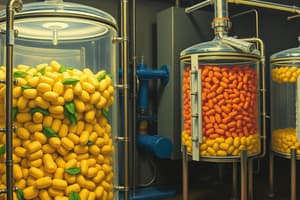Podcast
Questions and Answers
What is a crucial characteristic of an inoculum used for fermentation?
What is a crucial characteristic of an inoculum used for fermentation?
- It should be free of contamination. (correct)
- It can be derived from any environmental sample.
- It should be in an inactive state to reduce fermentation time.
- It must contain a variety of microorganisms.
Which of the following describes a significant risk during fermentation experiments?
Which of the following describes a significant risk during fermentation experiments?
- Contaminants competing with the original strain. (correct)
- Excessive production of NADH.
- Inadequate supply of nutrients for the spawn.
- Producing high levels of ethanol.
Which factor is NOT necessary for effective fermentation in a bioreactor?
Which factor is NOT necessary for effective fermentation in a bioreactor?
- Using various substrates and conditions. (correct)
- Detection of microbial contamination.
- A controlled environment.
- Continuous agitation of the mixture.
In which phase of batch culture is the inoculum typically introduced?
In which phase of batch culture is the inoculum typically introduced?
What is essential for the sterilization of a bioreactor?
What is essential for the sterilization of a bioreactor?
What is the primary reason for sterilizing a bioreactor before fermentation?
What is the primary reason for sterilizing a bioreactor before fermentation?
Which parameter is NOT essential for achieving sustainable microbial growth during fermentation?
Which parameter is NOT essential for achieving sustainable microbial growth during fermentation?
During which phase of batch culture growth do microbes adapt without a significant increase in biomass?
During which phase of batch culture growth do microbes adapt without a significant increase in biomass?
What is the purpose of maintaining positive pressure inside the bioreactor after sterilization?
What is the purpose of maintaining positive pressure inside the bioreactor after sterilization?
What is a key characteristic of the exponential phase in batch culture growth?
What is a key characteristic of the exponential phase in batch culture growth?
Flashcards are hidden until you start studying
Study Notes
Bioreactor Sterilization
- Sterilization is crucial to prevent contamination in fermentation processes.
- Bioreactors can be sterilized with or without medium present.
- Steam is used to sterilize bioreactors, heating the jacket or coil to achieve 15 psi for 20 minutes.
- Positive pressure must be maintained post-sterilization to avoid vacuum formation that can draw in unsterile air.
Key Parameters for Effective Fermentation
- Sterilization of media and equipment is essential.
- Adequate substrates and growth factors, such as vitamins, should be present in the medium.
- Agitation or stirring is necessary to ensure proper mixing.
- Temperature and pH need to be controlled for optimal microbial growth.
- Anti-foaming agents may be required to manage foam that disrupts operations.
- Overflow control is needed when continuously adding media.
- Aeration must be provided for aerobic processes to maintain oxygen levels.
Batch Culture Growth
- A batch culture is a closed system with a limited initial nutrient supply, restricting exponential growth.
- Microbial growth in batch culture progresses through four phases: lag phase, log (exponential) phase, stationary phase, and death phase.
- The lag phase involves adaptation, leading to minimal biomass increase.
- The log phase is characterized by rapid growth and nutrient consumption, reaching maximum biomass.
Applications of Fermentation
- Fermentation is utilized to produce dairy products like yogurt and alcoholic beverages using specific microorganisms.
- Yeast, specifically Saccharomyces cerevisiae, converts pyruvate into ethanol during alcohol fermentation, releasing carbon dioxide.
- Pyruvate conversion occurs in two steps: CO₂ release forming acetaldehyde, followed by its reduction to ethanol.
Role of Bioreactors
- Bioreactors allow microorganisms to process substrates under controlled conditions, producing various products.
- The term fermentor is often used interchangeably with bioreactor due to their fermentation capabilities.
Inoculum Preparation
- A healthy and active inoculum is vital for initiating fermentation.
- Criteria for inoculum: free from contamination, suitable morphology, sufficient volume, and retaining product-forming capabilities.
Avoiding Contamination
- Contaminants hinder fermentation by competing for nutrients and can be detected through microscopy and dataset analysis.
- Rapid growth of contaminants leads to increased CO₂ levels and biomass concentration, indicating issues with the fermentation process.
Bio-Ethanol Production Simulation
- The simulation focuses on optimizing conditions for yeast growth to maximize bio-ethanol production.
- Ethanol is produced through the fermentation of sugars, applicable in beverages and sustainable fuel generation.
- Various growth parameters, including temperature, gas composition, stirring levels, and pH will be tested for their effects on fermentation efficiency.
Learning Objectives
- Ability to simulate yeast batch fermentation and understand its principles.
- Knowledge of fermentor components and their functions.
- Skills in analyzing qualitative data and identifying optimal growth conditions for bio-ethanol production.
Key Techniques in the Lab
- Mastery of aseptic techniques to prevent contamination.
- Familiarity with bioreactor operation for effective fermentation processes.
Theory of Ethanol Fermentation
- Ethanol fermentation is an anaerobic process converting sugars into energy, producing lactic acid or alcohol as byproducts.
Studying That Suits You
Use AI to generate personalized quizzes and flashcards to suit your learning preferences.




